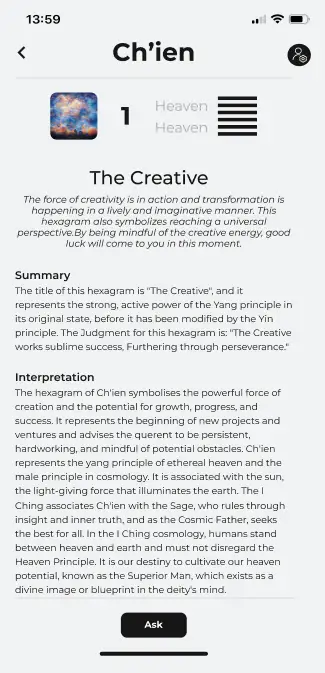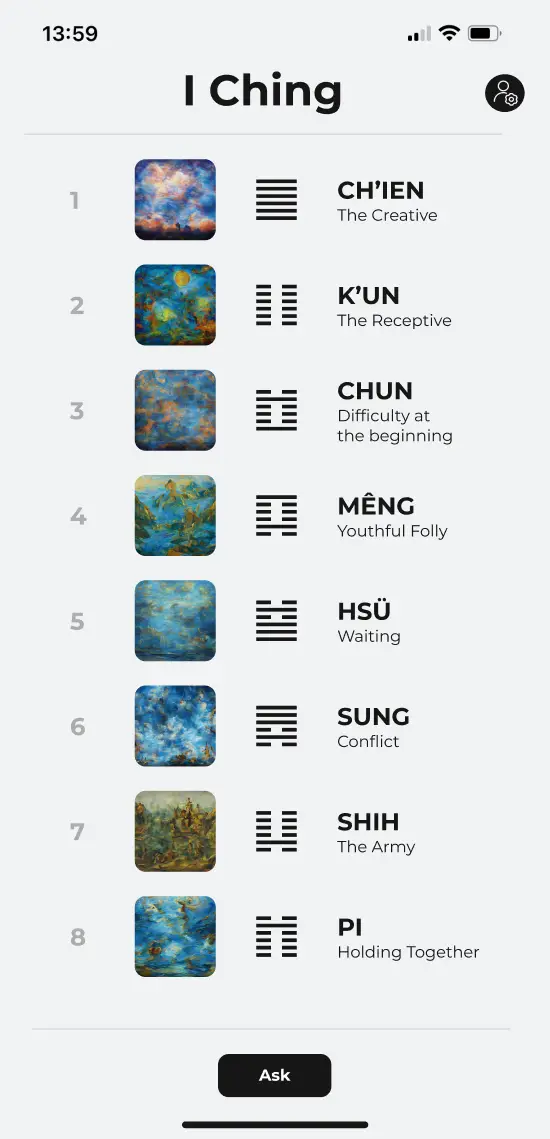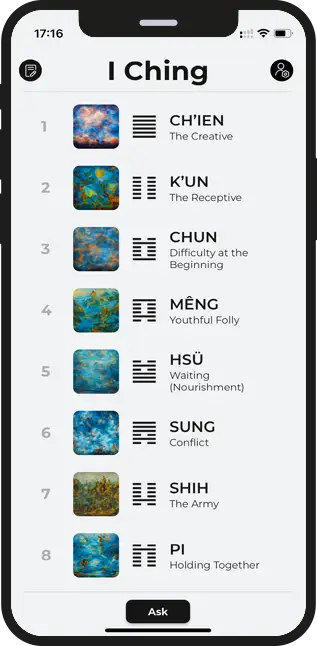
Earth
Heaven
Hexagram 11 - Peace - TAI
The path to inner peace is found in the right relationships, yet preserving it necessitates adherence to inner control. A harmonious existence is attainable for those who persist in virtuous thoughts and deeds.
Summary
Hexagram 11, also known as "Peace," represents a time of peace and harmony. The hexagram is composed of the trigrams for heaven and earth and is considered a time of balance and stability. The judgment for this hexagram states that it is essential to maintain humility and receptiveness in a time of peace.
Interpretation
The I Ching symbolises balance and harmony through Hexagram 11. This hexagram symbolises the perfect balance between heaven and earth forces, representing a person who has attained inner and outer equilibrium. The lower trigram represents an inner attitude that is self-contained and steadfast, while the upper trigram represents an open-minded receptiveness towards external events. This neutral attitude leads to reduced tensions and resolved relationships. However, one must be careful not to forget their principles and responsibilities in times of peace. The hexagram serves as a reminder to remain conscientious and continue learning, even when there is peace.
Think of yourself as a young tree that can reach great heights by staying balanced and focused on growth towards the light. This hexagram is interpreted as a time of peace and balance after a period of conflict, where one should maintain balance and avoid becoming extreme in beliefs or actions.
In Chinese culture, the hexagram is associated with balance and stability in relationships and society. It represents the "Mandate of Heaven," where the ruler holds power through divine will and must maintain balance to retain power. The hexagram is a reminder of the importance of peace, balance, and harmony in all aspects of life. Throughout history, this hexagram has been seen as a symbol of the equilibrium necessary for a harmonious society and government, emphasising the importance of balance within oneself and in one's interactions with others.
Sage Advice
Emphasises the importance of patience, inner balance, and harmony in navigating life's challenges. It advises waiting for the right time to act, avoiding conflict, and maintaining inner peace, even in difficult situations. The hexagram also encourages being sincere, honest, and genuine to oneself and being steadfast in one's beliefs and values. Additionally, it is essential to be aware of the potential consequences of one's actions and to take responsibility for them. The hexagram emphasises finding a balance between humility and assertiveness and being open to learning and growth. The overarching message of this hexagram is to focus on maintaining inner peace and stability and to wait for the right moment to act mindfully and responsibly.
Line 1
Signifies a moment of opportunity for growth and progress. The imagery of pulling up ribbon grass and having the sod come with it speaks to the interconnectedness of our lives and how our actions impact those around us. This line implies that to find good fortune; we must have an open and humble inner attitude. When we are available to each other and the world around us, we allow positive influences to flow freely. However, when we doubt our ability to receive help or become negative in our outlook, this connection becomes obstructed. This line reminds us that it's vital to deal with the root of our problems and work on our inner attitude to overcome obstacles and reach peace and progress. In essence, this line is a call to action, encouraging us to be open and humble as we navigate the challenges and opportunities in our lives. By staying connected to our inner wisdom and the world around us, we open ourselves up to good fortune and growth.
Line 2
Encourages us to maintain a balance during times of peace. It can be tempting to be overly harsh on those who make mistakes or to distance ourselves from those with troublesome egos. However, the line advises us to be gentle and to bear with these individuals and situations rather than forming a mental faction against them. The line also urges us to maintain independence, even during peaceful times. This means not letting the actions of others dictate our own and not becoming overly dependent on the peaceful state of affairs. We must remain vigilant and avoid being sidetracked by indolence or lured by flattery. Fording the river with resolution means that when situations arise that require us to withdraw and go on alone, we should not neglect to do so. This shows our commitment to following our path and not ignoring what is distant. The ultimate goal is to act as an intermediary between the Sage and others, remaining conscientious in all we do. By doing so, we can further the work of the Sage in the world around us and avoid being caught up in manipulative games. We must remain open-minded and patient with those who engage in such tactics while avoiding being seduced by flattery and maintaining our inner independence.
Line 3
Warns us of the dangers of becoming too attached to the peace and harmony of a given moment. The line notes that life is inherently cyclical, with periods of peace and prosperity inevitably followed by periods of difficulty and strife. During peaceful times, we may become emotionally dependent on people, events, or circumstances and unwilling to allow change. This can lead to a lack of preparedness when difficulties inevitably arise and result in wavering and indecision. To avoid this, the line advises us to maintain a sense of detachment and not become overly attached to people, events, or circumstances. Instead, we should expect the unexpected and always be prepared for tensions to resume. This will help us avoid making plans based on the assumption that things will always go well or poorly. By remaining calm and detached during times of difficulty, we can better hold firm to what is correct and weather the storms of life. Good fortune will return to those who can maintain this perspective and remain steadfast in the face of danger.
Line 4
The importance of sincerity and simplicity in our interactions with others. The line counsels us against the temptation to contrive or manipulate situations to achieve our desired outcomes. The line also cautions against boasting of our wealth, whether it be in terms of our wisdom, wit, or charm. By avoiding this self-aggrandisement, we can maintain a genuine and sincere demeanour, which will more likely result in creative and positive outcomes. Receiving this line may indicate that the Sage offers help and guidance in finding the correct approach to a problem. Alternatively, it may confirm that our sincere and guileless way of relating has already had positive results. To achieve success, the line advises us to meet others with sincerity, simplicity, and openness rather than seeking to impress or influence them. Doing so creates an environment of trust and mutual respect more conducive to positive outcomes.
Line 5
Speaks of the importance of patience and modesty in our relationships with others. The line uses the analogy of a marriage between a princess and someone of lower status to illustrate that in situations of close personal contact, the person with the more robust character should adopt a more modest attitude. The line notes that the Sage (represented as the "sovereign I") decides when the conditions for unity will become possible and that we must wait until then. When dealing with someone who is not on our level of understanding, we should avoid adding to their feelings of inferiority and instead adopt a humble and non-competing attitude. This creates a "truly modest union" that brings happiness and blessings. The line advises us to avoid the aggressive manoeuvrings of the ego and remain patient until the Creative (represented by the Sage) does its work. By doing so, we can reap the rewards of a more harmonious and fulfilling relationship.
Line 6
Speaks of the need to let go of resistance and submit to the wisdom of the Higher Power. The line notes that the wall (representing our defences and strategies) is falling back into the moat, indicating that it is time to dismantle our resistance to Fate. The line advises us to avoid resisting this process or concocting new strategies to escape it. Instead, we should disperse all effort and striving and humbly submit to the situation as it is, without resentment or resistance. By doing so, we will gain the help of the Higher Power to correct the situation. The line suggests that a waning is at hand and that we will be better served by embracing this process rather than trying to fight against it. By submitting to the wisdom of the Higher Power, we can find a greater sense of peace and understanding in even the most difficult of circumstances.








